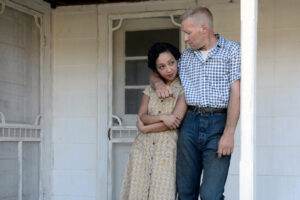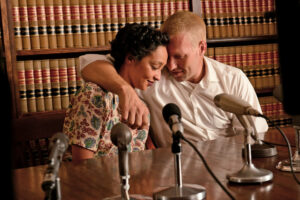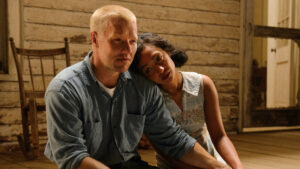Loving (2016) review
Dir. Jeff Nichols
By: Steve Pulaski
Rating: ★★★
Loving could’ve been writer/director Jeff Nichols’ sell-out movie. After a strong roster of lower-budget pictures, like the unforgettable one-two punch of Take Shelter and Mud, this would logically be the film where Nichols shortchanged his fine talents to make something more common and digestible. All he had to do with Loving was stick to biopic conventions, amplify the emotional manipulation to exorbitant levels, and make a film more historically relevant than human-centered.
In an act that seems like beautiful, cinematic retaliation, Nichols delivers a film that is so centered on the relationship at hand you forget that one of the most significant Supreme Court decisions regarding civil rights is being fought in the background. The only fitting analogy I can conjure up is it’s as if there is a potentially life-changing moment occurring across the street, which numerous others are filming and capturing in real-time, and Nichols decides to turn his camera on the people having intimate moments and natural reactions to whatever may be occurring. By doing so, he winds up making a film you don’t feel could’ve been helmed by just anyone and given nearly the same tender focus.

Set in Caroline County, Virginia, the film revolves around the relationship between Richard Loving (Joel Edgerton) and Mildred Jeter (Ruth Negga) in 1958. He is a white construction worker with an infinity for racing cars on a dragway, while she is a black woman who stays at home and takes care of the kids soon after they go to Washington D.C. to get married. Eventually, the law catches up with them and the Loving’s are sent to jail for violating Virginia’s anti-miscegenation laws. Thus begins a lengthy legal battle to try and get not only their marriage recognized as legal but the interracial marriages of others across the United States.
The judge initially grants both Richard and Mildred to be released from federal custody if they agree not to return to the state of Virginia together for twenty-five years; entering the state or living together during that probational time-period will result in prosecution. Mildred optimistically writes a letter to Attorney General Robert F. Kennedy, who passes the letter down to the American Civil Liberties Union lawyer Bernard S. Cohen (Nick Kroll). Cohen confides in a constitutional law expert named Phil Hirschkop (Jon Bass) and the two try to find a way to get Richard and Mildred’s case to build momentum all the way up to the Supreme Court where, of course, it would be known as Loving v. Virginia.
Meanwhile, Richard and Mildred sneak back illegally to Virginia the best they can, sneaking around by way of Mildred’s family or Richard’s close friends, who are mostly black as well, in order to give birth to their first child. As time marches on, they have three children, whom the law recognizes as merely bastards rather than legitimate children, as Richard persists on with the dream that he can live without fear in a home he built with his family.
Richard is a fascinating character. Played by an almost unrecognizable Joel Edgerton (The Gift) with a bleach-blonde buzz-cut, Richard is unfazed by the idea of his situation being so immense that it’s going all the way to the Supreme Court; he doesn’t even wanted to travel to D.C. to see how the case unfolds. When asked by Cohen if there is anything he’d like to tell the judge for him, Richard simply states, in a bit more than a whisper, “Tell the judge I love my wife.” Here’s a man who is not interested in courtroom theatrics, fighting tooth-and-nail for something he doesn’t think is that big of a deal; if he groveled, begged, and fought, perhaps he’d look at the situation as if there were something wrong that he’d believed he have to mask in particular rhetoric. Instead, his defense is how much he loves his wife.

Ruth Negga’s role is about as mild, reliant not on tears but just earnest behavior and a tender smile that peeks out in moments of motherly joy. Consider the scene when Life magazine photographer Grey Villet (Michael Shannon) comes over to the Loving’s home to take pictures for a cover-story regarding their legal battle. While Richard rests his head on Mildred’s lap as the two laugh as they watch what looks to be The Andy Griffith Show in the late evening, Grey quickly and quietly snaps a photo to use for his magazine that captures Mildred laughing and smiling. The real-life image appears at the conclusion of the film and is a keen summation of the entire picture’s focus.
Aside from two strong lead performances, Loving is assisted by a supporting cast of champions, as you probably could’ve inferred. It all starts with the surprising performance by Nick Kroll, in a rare dramatic role that shows yet another comic actor’s ability to convincingly and naturally assume a heavier, more serious role. In addition, Michael Shannon’s reedy voice and quieter presence as a simple photographer are a far-cry from his work as a passionate and unorthodox detective in Nocturnal Animals, but his brief role is handled well nonetheless.
Nichols’ spark, once again, comes in the way he handles characters and their situations without ever having the latter overshadow the former. Some may complain that Loving is absent a plot, a complaint that for most films I’m just so sick and tired of hearing. If you can’t recognize the idea of characters and their relationship with one another triumphing over the idea of typical courtroom scenes that work to glorify legalities instead of the issue that bound everyone in that room together, there’s no review or analysis of Loving that will change your mind. This is a film for those tired of the common tropes and hungry for something a bit more realized.
NOTE: As of this writing, Loving is available to rent on multiple platforms.
My review of Take Shelter
My review of Mud (2012)
My review of The Bikeriders (2024)
Starring: Joel Edgerton, Ruth Negga, Nick Kroll, Jon Bass, and Michael Shannon. Directed by: Jeff Nichols.
About Steve Pulaski
Steve Pulaski has been reviewing movies since 2009 for a barrage of different outlets. He graduated North Central College in 2018 and currently works as an on-air radio personality. He also hosts a weekly movie podcast called "Sleepless with Steve," dedicated to film and the film industry, on his YouTube channel. In addition to writing, he's a die-hard Chicago Bears fan and has two cats, appropriately named Siskel and Ebert!


